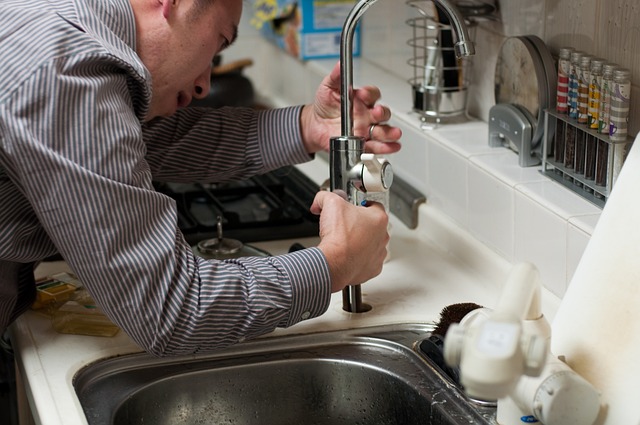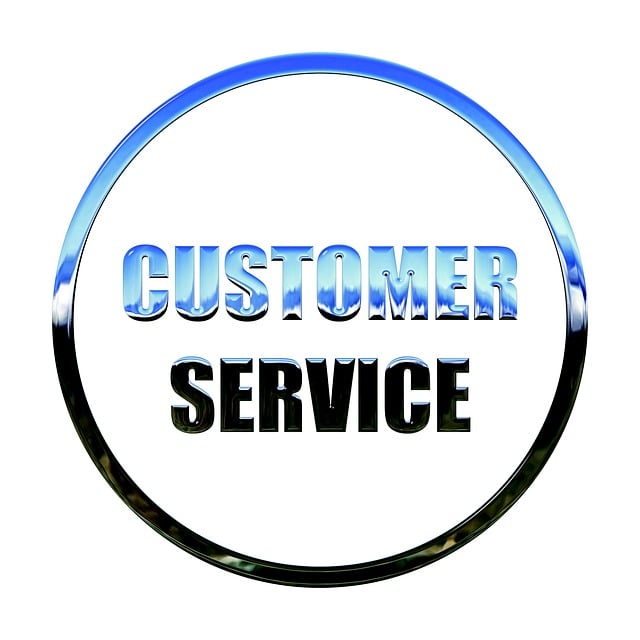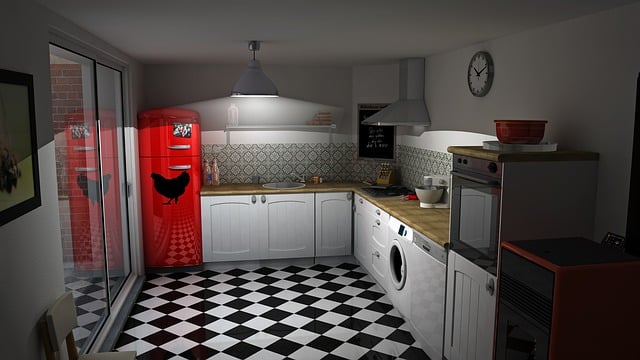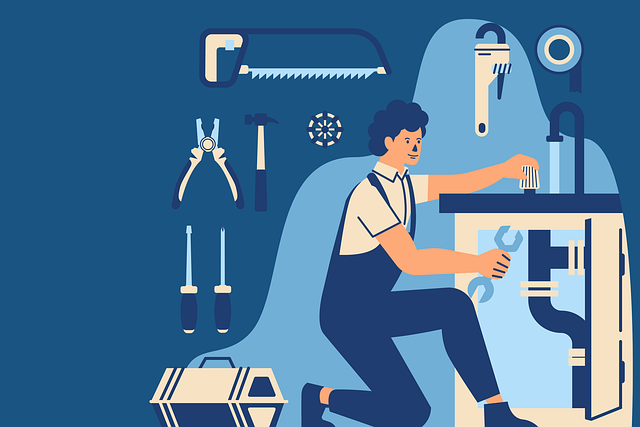Remodeling a kitchen? Prioritize kitchen plumbing services for both functionality and design. Skilled plumbers assess unique needs, redesign layouts, and navigate regulations to optimize efficiency. They install modern fixtures, address leaks & repairs, and ensure food-safe systems. Planning involves assessing layouts, consulting professionals, permitting, and setting budgets. Cramped spaces & outdated systems require specialized knowledge. Prioritize efficient water flow with advanced fixtures, durable pipes, and regular maintenance to avoid costly repairs.
Renovating your kitchen? Understanding the intricacies of kitchen plumbing is crucial. This comprehensive guide delves into the essential aspects of plumbing for kitchen renovations, from understanding specific requirements to selecting the right services and professional advice. We explore common challenges and provide maintenance tips to ensure efficient water flow and waste disposal. Discover how to navigate this complex process smoothly, making your kitchen renovation a successful and stress-free experience with optimal kitchen plumbing services.
Understanding Kitchen Plumbing Requirements

When embarking on kitchen renovations, understanding the plumbing requirements is a vital step. Kitchen plumbing services encompass more than just installing or fixing water lines; it involves ensuring efficient and effective water supply and waste management systems. Every kitchen has unique needs, from hot water dispensers to multiple sink setups, and modern conveniences like dishwasher connections.
Plumbers skilled in kitchen renovations work with homeowners to assess these needs, designing layouts that cater to functionality and aesthetics. They consider factors such as the placement of appliances, sinks, and faucets, ensuring optimal plumbing efficiency while also adhering to local building codes and regulations.
Types of Kitchen Plumbing Services

When it comes to kitchen renovations, proper plumbing is an essential component that often goes unnoticed until issues arise. Kitchen plumbing services encompass a range of specialized tasks designed to enhance functionality and aesthetics. From installing new faucets and sinks to redesigning water supply lines and waste disposal systems, these professionals ensure every element works seamlessly.
The scope of kitchen plumbing includes, but is not limited to, leak detection and repair, pipe replacement or relining, and the installation of modern fixtures that offer improved water pressure and energy efficiency. They also specialize in food-safe plumbing, ensuring clean water supply for cooking and preventing contamination. By employing the expertise of these specialists, homeowners can achieve a functional and stylish kitchen while adhering to important health and safety standards.
The Role of a Professional Plumber in Renovations

When embarking on kitchen renovations, the role of a professional plumber cannot be overstated. They are integral to ensuring that your renovated space boasts not just an aesthetically pleasing design but also efficient and reliable plumbing systems. With their expertise in kitchen plumbing services, they can navigate complex layouts and install or replace pipes, fixtures, and appliances seamlessly.
A skilled plumber can offer valuable insights into the latest plumbing trends and technologies, enhancing the functionality and longevity of your kitchen’s plumbing. They can also help you avoid potential issues like leaks, clogs, or low water pressure by implementing preventative measures during the renovation process. Their work ensures that your kitchen’s plumbing adheres to safety standards, providing a comfortable and efficient space for years to come.
Planning and Preparation for Kitchen Pipeline Installation

Planning and preparation are key aspects of a successful kitchen renovation, especially when it comes to kitchen plumbing services. Before any installation begins, it’s crucial to assess the current plumbing layout and identify areas that may require modifications or upgrades. This involves consulting with experienced plumbers who can provide valuable insights and ensure the new pipeline design aligns with both aesthetic goals and functional needs.
During preparation, it’s essential to consider factors like water supply lines, drain systems, and gas connections for appliances such as stoves and dishwashers. Proper planning includes obtaining the necessary permits and ensuring compliance with local building codes to avoid future complications. Additionally, setting a clear budget and timeline helps in managing expectations and facilitates a smoother renovation process.
Common Challenges in Kitchen Plumbing Projects

When embarking on kitchen renovations, one often overlooks the intricacies of plumbing—a crucial aspect that can make or break a project. Common challenges include cramped spaces, which can complicate the installation of new fixtures and pipes, especially in older homes. Navigation through these confined areas demands skill and precision to avoid damaging existing structures.
Another hurdle is updating outdated plumbing systems to meet modern standards while adhering to local regulations. Kitchen plumbing services often require replacing old pipes with more efficient ones to enhance water flow and pressure. This process necessitates specialized knowledge to ensure the new system is not only functional but also compliant, preventing potential legal issues and costly repairs down the line.
Ensuring Efficient Water Flow and Waste Disposal

When renovating your kitchen, efficient water flow and waste disposal systems are essential for a functional space. Kitchen plumbing services should prioritize installing high-quality fixtures designed to handle heavy usage. This includes selecting the right type of pipes, fittings, and appliances that can manage increased water pressure and volume while maintaining optimal performance.
A well-designed plumbing system ensures minimal clogs and leaks, providing a smooth cooking and cleaning experience. Modern kitchen plumbing solutions offer various options for waste disposal, from traditional trash cans to advanced garbage disposals. These systems are designed to grind food waste into small particles, preventing buildup and allowing for easier maintenance. Efficient water flow is also achieved through aerators on faucets and showerheads, which mix air with water to maintain pressure while reducing water consumption.
Maintenance Tips for Longevity

Regular maintenance is key to ensuring your kitchen’s plumbing system lasts for years to come. Start by inspecting pipes and fixtures for any signs of damage, corrosion, or leaks on a monthly basis. Addressing these issues promptly can prevent more serious problems down the line. Keep an eye out for slow-flowing water, which could indicate a clog in the drains or pipes. Using a plumbing snake or calling in professional kitchen plumbing services for routine clearing is beneficial to maintain optimal water flow.
Additionally, insulating exposed pipes during colder months can prevent freezing and subsequent bursts. Regular cleaning of water heaters and filters will ensure efficient heating and remove any buildup that could affect performance. Remember, staying proactive with maintenance tasks not only extends the life of your kitchen plumbing but also saves you from costly repairs and disruptions to your daily routines.
